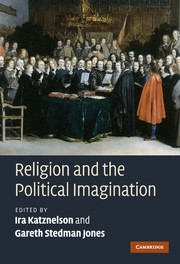Book contents
- Frontmatter
- Contents
- List of contributors
- Acknowledgements
- Introduction: multiple secularities
- 1 Secularisation: religion and the roots of innovation in the political sphere
- 2 Regarding toleration and liberalism: considerations from the Anglo-Jewish experience
- 3 The Enlightenment, the late eighteenth-century revolutions and their aftermath: the ‘secularising’ implications of Protestantism?
- 4 In the lands of the Ottomans: religion and politics
- 5 The Russian Orthodox Church and secularisation
- 6 The American experience of secularisation
- 7 French Catholic political thought from the deconfessionalisation of the state to the recognition of religious freedom
- 8 Religion and the origins of socialism
- 9 From 1848 to Christian Democracy
- 10 The disciplining of the religious conscience in nineteenth-century British politics
- 11 Colonial secularism and Islamism in North India: a relationship of creativity
- 12 The 1960s
- 13 Gendering secularisation: locating women in the transformation of British Christianity in the 1960s
- 14 Does constitutionalisation lead to secularisation?
- 15 Europe's uneasy marriage of secularism and Christianity since 1945 and the challenge of contemporary religious pluralism
- 16 On thick and thin religion: some critical reflections on secularisation theory
- Index
15 - Europe's uneasy marriage of secularism and Christianity since 1945 and the challenge of contemporary religious pluralism
Published online by Cambridge University Press: 05 June 2012
- Frontmatter
- Contents
- List of contributors
- Acknowledgements
- Introduction: multiple secularities
- 1 Secularisation: religion and the roots of innovation in the political sphere
- 2 Regarding toleration and liberalism: considerations from the Anglo-Jewish experience
- 3 The Enlightenment, the late eighteenth-century revolutions and their aftermath: the ‘secularising’ implications of Protestantism?
- 4 In the lands of the Ottomans: religion and politics
- 5 The Russian Orthodox Church and secularisation
- 6 The American experience of secularisation
- 7 French Catholic political thought from the deconfessionalisation of the state to the recognition of religious freedom
- 8 Religion and the origins of socialism
- 9 From 1848 to Christian Democracy
- 10 The disciplining of the religious conscience in nineteenth-century British politics
- 11 Colonial secularism and Islamism in North India: a relationship of creativity
- 12 The 1960s
- 13 Gendering secularisation: locating women in the transformation of British Christianity in the 1960s
- 14 Does constitutionalisation lead to secularisation?
- 15 Europe's uneasy marriage of secularism and Christianity since 1945 and the challenge of contemporary religious pluralism
- 16 On thick and thin religion: some critical reflections on secularisation theory
- Index
Summary
Europeans pay little heed to the requirements of religious observance. In that sense, they deserve to be characterised as ‘post-Christian’. Yet, the integration of Islam and Muslims has proven surprisingly difficult for a public that claims to care little about faith. Governments and courts have only recently begun to puzzle out the meaning of state neutrality in newly multi-religious societies while faced with assertive political voices reiterating the importance of Christianity to the European identity.
Many subjects of European states – residents and citizens – no longer adhere to the official state Churches. Muslims comprise between 2 and 8 per cent, about fifteen million people, of the populations of the dozen west European countries with significant immigrant-origin minorities. Scientologists, Hassidim, Mormons, Catholics hewing to the Latin mass, Hindus, and many other groups, new and old, immigrant-origin or old European, are a growing presence. The European Evangelical Alliance, a lobbying organisation for the Evangelical churches in Brussels, claims fifteen million members. Born-again Christians adhere to the same Bible as Europe's Christians but the American-style Evangelical churches share with Muslims the status of outsider and the lack of official recognition. Their demands for accommodation strain the institutional habits of states sanctioned by Europe's national confessions, Protestant or Roman Catholic. Some European cities now face the prospect of becoming minority Christian and the need to adjust public calendars, municipal and social services, and consultation practices to reflect this fact. Change is invariably accompanied by squawking from the losers.
- Type
- Chapter
- Information
- Religion and the Political Imagination , pp. 314 - 335Publisher: Cambridge University PressPrint publication year: 2010
- 1
- Cited by



